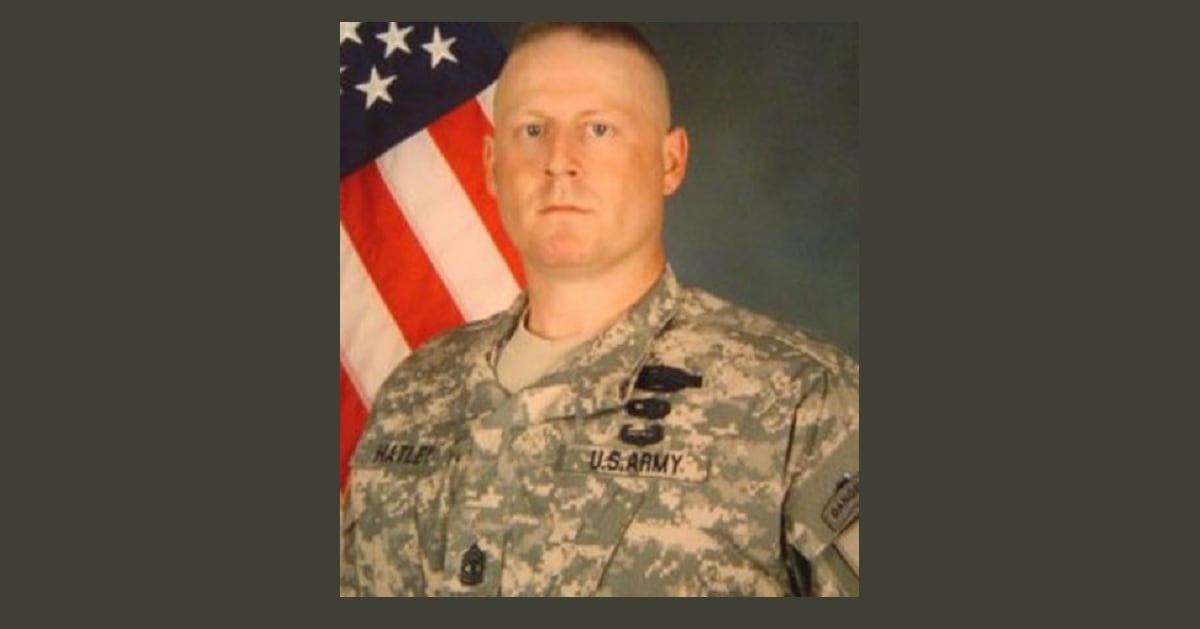A former Army first sergeant has been paroled following more than 11 years in prison for his role in the deaths of four Iraqi detainees in February 2008.
Former 1st Sgt. John Hatley was originally sentenced to life in prison, which was later reduced, and he was granted parole when he became eligible last year.
The 52-year-old Texas native married his pen pal-fiancée Pamela Miller Friday, the same day he was released from U.S. Disciplinary Barracks at Fort Leavenworth, Kan.
RELATED

Granting parole does not alter a person’s conviction or guilty status, it is a means by which to release prisoners who have served a portion of their sentences and shown good conduct. Parole violations will send a person back to prison, as they are still guilty of the crimes they committed.
Hatley pleaded not guilty to the crimes at his 2009 trial and continues to deny that the killings took place at all. His private attorney, John Maher, told Army Times before his client’s parole that there was no physical evidence that four Iraqi detainees had been killed, no bodies recovered or men reported missing.
With the support of the nonprofit group United American Patriots, Hatley, who has returned to his Groesbeck, Texas, home, is seeking a full pardon from President Donald Trump.
Trump granted three pardons to controversial military figures in late 2019:
* Army 1st Lt. Clint Lorance, who was convicted of second-degree murder in the death of two Afghan men.
* Army Maj. Mathew Golsteyn, who faced a murder trial this year for an alleged unauthorized ambush and reprisal killing of a suspected Taliban bombmaker.
* Special Warfare Operator Navy SEAL Chief Edward Gallagher who was acquitted of a string of war crimes involving the alleged stabbing of a wounded teenage Islamic State fighter, but ultimately convicted only of posing with the boy’s dead body.
UAP had previously supported pardons and other efforts on behalf of the defendants in all three of those cases.
David Gurfein, the group’s chief executive officer, told Army Times that the lack of hard evidence against Hatley was a major factor in supporting the former first sergeant.
But, Gurfein said, cases such as Hatley’s have similar themes, his group has noticed.
“Any times allegations were brought up of civilians being killed, all of the sudden there was a rush to judgement,” Gurfein said.
He added that often there has also been undue command influence and prosecutorial misconduct in such cases.
The prosecution relied on testimony from Hatley’s fellow soldiers, members of Alpha Company, 1st Battalion, 18th Infantry Regiment, 1st Infantry Division, many of whom faced charges themselves.
Two charged in the deaths, Sgt. 1st Class Joseph Mayo of North Carolina, and Sgt. Michael “Doc” Leahy of Downers Grove, Illinois, both pleaded guilty to executing the detainees along with Hatley. Detailed video interviews recount the incident.
Both Mayo and Leahy were handed lengthy sentences as well, and both became parole eligible in 2015. Information on their current status was not immediately available, however.
Maher, Hatley’s attorney, noted that at his client’s clemency and parole board hearing last year, six congressional representatives arrived to show their support for his parole.
“It’s something I’ve never seen before,” Maher said. That coupled with his client’s exemplary behavior while incarcerated for nearly a dozen years and testimony and letters of support likely played a large role in his parole being granted.
But also key to his release, Maher emphasized, were the mitigating factors such as the lack of bodies or reports of missing people and the complete reliance on witness testimony.
You can have a murder without a body, but you have to have an identity, Maher said.
“In this case, none of that happened,” Maher said. “CID canvassed the neighborhood near the canal, drug the canal, no forensic or tangible evidence.”
“Do we have murders without bullets, bodies, identities?”
Staff Sgt. Jess Cunningham was one of about a dozen soldiers on the patrol that caught five Iraqis suspected of being insurgents. Cunningham later told authorities that he declined to participate in the killings but witnessed them.
The unit picked up the men, Cunningham said, and Hatley and Mayo suggested killing them to prevent the suspected insurgents from being released and posing a future threat. Cunningham said he wouldn’t do that and, he said, Hatley, Mayo and Leahy initially seemed to relent.
But after finishing the patrol, Cunningham said, Hatley took a smaller detachment of about two squads from Alpha Company, along with the detainees, back out of the forward operating base.
After reaching a canal, Hatley, Mayo and Leahy took the detainees out of the vehicle and shot them execution style, Cunningham told investigators.
Hatley maintains that the killings never happened, that they released the men after the patrol. He claims that all of the platoon members who spoke against him in interviews with Army Criminal Investigation Division agents were pressured to do so or face conspiracy charges for being part of the alleged crime.
Cunningham has characterized Hatley as an imposing senior enlisted leader who dominated soldiers in the company, and that the rules of engagement that were important were those that he defined, according to an in-depth Vanity Fair profile of Cunningham, Hatley and the case, published in 2015.
The staff sergeant was the first to report the killings, a year after the incident and after Alpha Company had left Iraq. In interviews with authorities and the media, he said he feared for his safety if he reported them during the deployment.
Also, in the Vanity Fair interview, Cunningham said he was ostracized by the unit for his resistance to the crimes and further harassed online by Hatley supporters after he came forward and following the convictions.
Todd South has written about crime, courts, government and the military for multiple publications since 2004 and was named a 2014 Pulitzer finalist for a co-written project on witness intimidation. Todd is a Marine veteran of the Iraq War.









